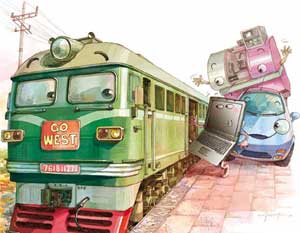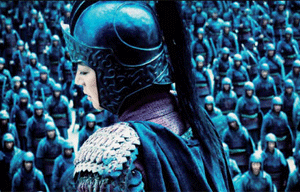Author uses history to detail women's plight
Updated: 2011-09-23 17:20
By Kelly Chung Dawson (China Daily USA Weekly)
|
|||||||||
|
 Lisa See, author of Snow Flower, is working on a novel about the Chinese nightclub tour circuit. |
When Chinese-American author Lisa See sat down to watch the recently released film adaptation of her 2005 best-selling book Snow Flower and the Secret Fan, it wasn't quite as she'd imagined.
With her agreement, film producers had added a modern storyline following the parallel friendship of two present-day Shanghai girls. The result was a beautiful film, but to call it a true adaptation might not be accurate, she said in an interview with China Daily.
"When you read something you're often creating a movie in your own mind of what the characters look like, what it smells like, and what it sounds like," she said. "I think that as an artist, I passed a piece of work to another artist, the director, and the movie is naturally his interpretation and aesthetic filtered through his life experiences."
Directed by acclaimed Joy Luck Club director Wayne Wang and starring Li Bingbing ("the Meryl Streep of China," as See described her) and South Korean actress Gianna Jun, the film premiered in July. Florence Sloan and Wendi Deng Murdoch, the wives of ex-MGM CEO Harry Sloan and News Corp CEO Rupert Murdoch, respectively, produced the film.
The decision to modernize the adaptation was, in part, a business one, See said. American audiences are less likely to watch subtitled period pieces, she said.
Fortunately, the parts of the film that follow the book are very true to the original story, the result of extensive research and attention to detail by the filmmakers, she said.
"The women I wrote about went through a lot in their lifetimes and I wanted that to be honored," she said. She described one scene in the movie which had featured a woman stirring a pot of rice, a small inaccuracy in food preparation that she was quick to correct in talks with the filmmakers.
See is currently promoting a new book titled Dreams of Joy, a sequel to 2009's Shanghai Girls. The book depicts a young Chinese-American woman who leaves America to pursue her ideals right before the advent of the "cultural revolution" (1966-1976). Her mother, certain that her daughter is leaping to her death, follows her to China in hopes of bringing her back to the West.
Although not much has been written on the subject, large numbers of overseas Chinese returned to China during that time, and many later escaped as massive famine overtook the country.
Untold stories attract See, she said.
In Shanghai Girls, See wrote about the American Confession Program of 1957, in which Chinese who had arrived in America as illegal "paper sons" were promised citizenship if they confessed their illegal status and shared information about friends and other community members. The program tore communities and families apart, See said.
"I'm attracted to stories that are covered up," she said. "The great leap forward and this idea of what China was like in those years and how closed or open it was, that attracted me," she said. "I felt with both (Shanghai Girls and Dreams of Joy) that I wanted to write about these subjects because the people involved are only getting older."
In writing about the Cultural Revolution, See goes into great detail about the suffering and difficulty of life during that period, but she also felt a need to right the misconception that China was entirely closed off, she said.
"Many Chinese and Westerners traveled into China during that time," she said. "Our perception of China being completely closed, and that Nixon was the one who actually opened China, I think that's somewhat of a misconception."
See, who is one-eighth Chinese and grew up in Los Angeles, spent a lot of her childhood with her father's Chinese relatives. After working as a journalist for the first part of her career, she began researching her family's history for her first book, On Gold Mountain: The One-Hundred-Year Odyssey of My Chinese-American Family (1996).
"I had this realization that we learn about history in terms of war and dates, but it's actually something that happens to individuals," she said.
"Did they fail? Did they rise to the occasion? I realized I could tell a story about the history of America using my family, and that changed my life, because I really felt that there was so much to write about with the Chinese and Chinese-American experience. I could write about women, I could write about things that had been lost or forgotten or deliberately covered up. I've always felt compelled to find those stories and write about them in a way that people will connect to."











